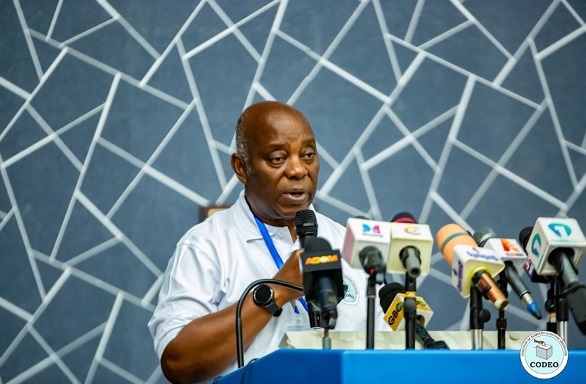The Coalition of Domestic Election Observers (CODEO) has deployed 4,000 election observers across the country to monitor the 2024 Presidential and Parliamentary elections, according to the Board Chairman, Rev. Dr Fred Deegbe.
Rev. Deegbe explained that 3,401 Rapid Response Observers will be stationed at a representative sample of CODEO stations in all 276 constituencies across the 16 regions of Ghana. This total includes 1,500 Private Voter Tabulation Observers (PVT), who will be deployed to a statistically representative sample of CODEO stations, and 1,000 Youth Observers. The Stationary Observers will monitor the elections at assigned polling stations, from setup to the declaration of results.
The CODEO stationary observers will submit regular observation reports, reflecting their findings and providing updates on any incidents throughout the day.
Meanwhile, CODEO’s mobile observers will visit various polling stations, particularly those without stationary observers. They will also submit reports based on their observations.
Later on December 7, CODEO’s constituency and regional coalition centre observers will report to coalition centres nationwide, offering updates on the election process and the coalition of election results.
Event
Rev. Deegbe was speaking at the Coalition's final press briefing at the Kofi Annan Peacekeeping Training Centre in Accra on Friday, December 6, which formed part of the Coalition's efforts to ensure transparency and provide timely updates on its election observation activities.
"The Rapid Response Observers will include 307 CODEO Regional Coordinators and Constituency Supervisors. The Roaming Observers will be at all 276 constituencies where voting will occur. In addition, members of the CODEO Advisory Board and the CODEO General Assembly will undertake roaming observations in various constituencies," he said.
![]()
"For the first time, CODEO will also have 16 observer stations at the 16 regional coalition centres of the Electoral Commission while two observers will also be deployed to the National Coalition Centre in Accra," he explained further.
"CODEO leverages statistical principles to select polling stations for its Rapid Response Observers. The deployment and observation plan ensures an issue-wide presence and visibility in every region and constituency, including remote and hard-to-reach areas," he added.
Preparations
He outlined the intensive preparations undertaken by the Coalition prior to the final day of election, including recruitment and training of 276 constituency supervisors nationwide in November.
"Finally, in November, the Coalition recruited and trained Podium station rapid response observers. Every recruited observer received training in election and election observation, including the legal framework for elections, election day procedures, election observation and tools of observation, as well as the code of conduct for election observers.
"To ensure their adequate preparation, officials from the Electoral Commission facilitated training in the voting processes. CODEO observers were recruited mainly from its member organisations, as well as selected youth-focused organisations.
"Ladies and gentlemen, with all these preparatory efforts successfully executed, we are confident that our observers have received the highest quality of training and are ready to carry out this important national assignment," he said.
The press briefing was attended by the Co-Chair of CODEO, Mrs Elizabeth Joyce Villars, and other Board members, including Executive Director, Ghana Centre for Democratic Development, Prof. Kwasi Prempeh; the National Security Coordinator, Mr Kofi Bentum Quantston; the Director, West Africa Civil Society Institute, Mrs Nana Asantewaa Afadzinu, and former Commissioner, Ghana Police Service, Ms Gifty Florence Anim.
The event brought together partners, including the American people, through the United States Agency for International Development, USAID, the National Democratic Institute, the Embassy of the Kingdom of the Netherlands, the Foreign, Commonwealth and Development Office of the UK and the European Union.

